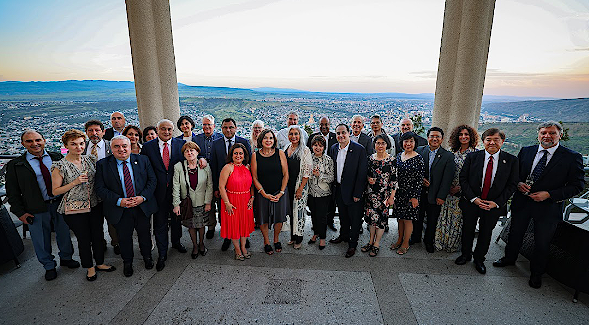San Diego State University Extends Georgia Program By Four Years
Georgia Minister of Education and Science Giorgi Amilakhvari called the SDSU Georgia program “the most important project implemented between Georgia and the USA in the direction of higher education.” The program had been set to end after nine years with the May 30, 2023 graduation in Tbilisi, the fifth cohort of graduating students. Instead, San Diego State University and the Georgia Ministry of Education and Science used the occasion to sign a memorandum of understanding that extends the program another four years.
SDSU Georgia was formed in 2014 through a grant from the Millennium Challenge Corporation. The country of Georgia, which sits at the intersection of Eastern Europe and Western Asia, faced a critical workforce shortage in fields related to science, technology, engineering and mathematics (STEM).
SDSU would partner with three major public universities – Tbilisi State University, Ilia State University and Georgian Technical University – to offer accredited SDSU bachelor’s degrees in six core areas: chemistry/biochemistry, computer science, computer engineering, civil engineering, construction engineering, and electrical engineering.
“SDSU Georgia has been a very powerful case study in international collaboration and friendship,” said SDSU President Adela de la Torre. “Education has a unique ability to bring people together across borders, cultures and languages in pursuit of a greater good. We have formed an enduring bond with our peers and colleagues in Georgia and I am pleased to extend this program together.”
In its nine years, more than 500 Georgian students have completed four-year degrees. Of the first four cohorts, more than 70 percent went on to careers in their fields, with the rest pursuing careers in academia. Meanwhile, through faculty and administrative partnerships, SDSU Georgia also focused on creating transformative systems, accreditations and infrastructure for the students of the future.
“From the beginning, an important goal of this program has been to equip and enable our partner universities to carry on this important mission independently,” said Hala Madanat, SDSU vice president for Research and Innovation. “We’ve built wonderful working relationships and I am confident that our extension of the program will give us the opportunity to further strengthen these capabilities.”
During the four-year extension, a new cohort of 90 Georgian students will pursue bachelor’s degrees in computer science, computer engineering and civil engineering. The project will be jointly financed by the government of Georgia and SDSU.
“Together we have not only addressed a vital need but also shared a vision for creating access and opportunity through public education,” said SDSU Georgia Dean Halil Güven. “The success and contributions of our graduates are clear to see, and we are proud that many of those graduates are women, minorities and from other groups classified as socially vulnerable.”
At the May 30 signing of the memorandum of understanding for the four-year extension of SDSU Georgia, Ilia State University awarded honorary doctorate degrees to de la Torre, SDSU Vice Provost Bill Tong and Güven in recognition of the positive impact they and SDSU Georgia have had on higher education in the country.
The announcement of the extension of SDSU Georgia comes as public attention on Eastern Europe remains focused on territorial hostilities sparked by Russia’s invasion of Ukraine. In her acceptance speech for her honorary degree, de la Torre pointed to SDSU Georgia as an example of the power of educational diplomacy in building political and economic democracy.
“Universities like SDSU can serve a central role in promoting international accreditation and higher education quality standards, which are sorely needed by former Soviet bloc nations to accelerate their workforce and economic plans,” said de la Torre. “Together with our Georgian partners, we are educating the next generation of scientific innovators, technology leaders, thoughtful entrepreneurs, and high-impact engineers.”

